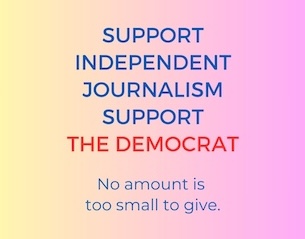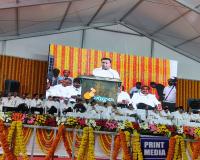- More
- 2nd Day of #Medianext 2020 Witnesses Renowned Brand Personalities Discussing Novel Ideas
2nd Day of #Medianext 2020 Witnesses Renowned Brand Personalities Discussing Novel Ideas
Dr. Sunayan Bhattacharjee Kolkata : Brand gurus and advertising honchos discussed ideas and deliberated on novel concepts on the second day of #MediaNext 2020, organized by the Kolkata-based Adamas University. The second day focused on Digital Advertising & Brand Communication. The speakers for the day included bigwigs including the internationally acclaimed ad filmmaker and the Founder

Dr. Sunayan Bhattacharjee
Kolkata : Brand gurus and advertising honchos discussed ideas and deliberated on novel concepts on the second day of #MediaNext 2020, organized by the Kolkata-based Adamas University. The second day focused on Digital Advertising & Brand Communication.
The speakers for the day included bigwigs including the internationally acclaimed ad filmmaker and the Founder of Genesis Films Prahlad Kakkar; Karl Gomes, the Founder of Fanatics; Yashraj Vakil, the CEO of Buzzinga Digital, Dr. Anurag Batra, the Editor-in-Chief of BW Businessworld and Exchange4media and Samrat Mukherjee, the Founder of Crow’s Nest.
The conclave is being organized in association with Sharda University, Birla Global University, DME, AIMEC, Lok Samvad Sansthan, Exchange4media, ABP Education and IndiaReal. The mega conclave is being organized over a period of 10 days from June 1, 2020 to June 10, 2020. Each day of the conclave focuses on one specialized domain of the Media and Entertainment (M&E) industry and the impact of the Covid-19 pandemic on that specific domain.
Prahlad Kakkar, who is known for his works with Sachin Tendulkar and Amitabh Bachchanbegan the proceedings with his characteristic charisma and quipped that building brands is all about building trust. He said, “For a brand, it is absolutely essential to constantly deliver on promises.”
Prahlad iterated, “Consumers are more likely to buy the brands that they remember and they will remember only those brands that touched their lives in a humane way.” He went on to add that while naming a brand, one has to remember what the name signifies. He said, “Naming a brand is just like naming a child.”
He remarked that just like human beings, brands could be judged when the going gets tough. In a situation like the ongoing Covid-19 pandemic, a brand can’t run away from its obvious social responsibilities. Prahlad added that it is better to promise less and deliver more.
In what seemed like a comment on the contemporary scenario, Prahlad confided that 70 per cent of the existing consumers are below the age of 30 years. Consequently, a brand needs to adopt a fresh approach though adopting a fresh approach doesn’t translate to changing the values that the brand represents.
He added, “At times such as these, brands need to alter their communication and reassure the consumers that the brand is with them. It is important to understand that brands should change the way human behaviours change. Brands, thus, have to be aware of the Covid-19 considerations.”
To illustrate his point, Prahlad took the example of layoffs and salary cuts carried out by multiple organizations. According to him, this overt emphasis on saving the bottom-line can make the brand appear inhuman and eventually actually destabilize the brand.
In another interesting remark, Prahlad advised people who are above the age of 40 years to go back to the school and equip themselves with modern technological knowledge. He also talked about the concept of political branding and emphasized on how the Indian Prime Minister Narendra Modi has converted himself into a true brand.
Right after the talk by Prahlad Kakkar, Prof. (Dr.) S.P. Singh, the Vice Chancellor of Royal Global University in Guwahati, also gave a motivational talk to cheer up students and youngsters locked inside their homes. He stressed on the importance of continued learning and urged students to have a hunger to learn new things.
Next in line was Karl Gomes. Karl, who was earlier with Dentsu and Rediffusion, gave a rather interesting insight into the advertising industry. He started by asking the audience if advertising is a luxury or a necessity. Reacting to varied reactions from the audience, Karl quipped that there is a definite way that could be followed to convert advertising into a necessity.
Karl implored brands to turn advertising into experience and create positive words of mouth. That way, whatever a brand does becomes advertising by default. Karl toed a very interesting line and said that communication needs to turn to conversations for brands to succeed.
Karl added, “It is important to focus on the customer journey instead of the brand journey.” He also said that the messaging by brands has to be targeted to relevant people. He also remarked, “Only humanity can see brands survive a scenario like the Covid-19 pandemic.”
Karl also emphasized on the importance of data, automation and intelligence and laid special stress on the concept of growth hacking in order to be successful.
Following Karl, Yashraj Vakil took the centrestage and delivered a rather relevant talk on how digital advertising works and why digital is the only way forward. He started his discourse by pointing out of the most important traits of the digital medium – its measurability. According to him, the impact of digital advertisements and digital campaigns can be estimated using a definite scale.
Referring to the seamless nature of the digital media, Yashraj added, “India is very diverse in terms of its demographic composition and hence it is very important to be in the digital space.” He said that the potential for growth of the digital media in India is infinite. To substantiate this point, Yashraj pointed out that India has more internet users in the rural areas than urban areas.
Another very pertinent point that Yashraj referred to is the fact that Indian languages would drive the growth of internet in India and added that for mass brands, regional content is becoming critical.
Yashraj then explained the digital advertising model in great details and gave case studies of how his company created digital advertising campaigns for multiple brands. He did a comparison of advertising costs for all of television, radio, general digital media and social media and referred to the lowest rates for social media.
The gentle and suave Dr. Anurag Batra, who is considered to be one of the pioneers in digital media, began his talk by emphasizing on the importance of reading for media students. He stressed on the importance of language media and added that he is in the business of building communities through the usage of content.
Dr. Batra iterated, “The future of media is storytelling with format being no bar.” Subsequently, he gave another very important lesson to aspiring media professionals. He advised all prospective media professionals to become domain experts in order to be successful.
While Dr. Batra stressed on the increasing importance of video, he also mentioned that text would continue to stay relevant. He added, “The role of influencers and bloggers would continue to grow.” He then went on to explain the difference between content marketing and influencer marketing while maintaining that both depend on storytelling. In an obvious reference to rote learning, Dr. Batra confided that degrees are overrated.
Dr. Batra had some strong suggestions for the learners. He told them to keep doing, reading, be unconventional and take up projects while continuing to soak in the experiences in the process.
The pleasing Samrat Mukherjee took over the mantle from Dr. Batra. Samrat started his technically rich presentation by conversing about what media is all about and what exactly is the function of media in the overall branding and advertising world. He said, “Everything is influenced by brand communication.”
Samrat added that brands always communicate about the product and the consumers want to know about the fulfillment of their needs. Samrat then went on to talk in details about how social and digital advertising happens. He quipped that one-on-one communication with consumers has become very important in the changed scheme of things.
Samrat also gave a brief about the concept of prosumerism. He also explained about how brands are increasingly becoming publishers to acquire increased eyeballs.
ooo











